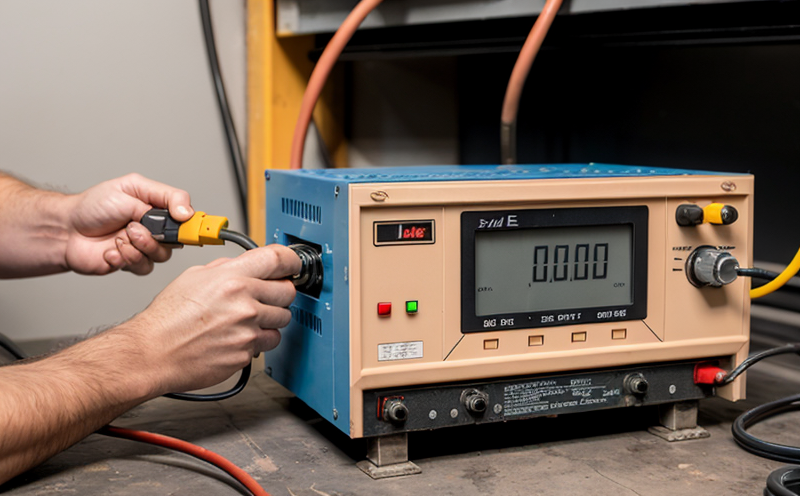IEC 60749-61 Die Bias Stress Reliability Testing
The IEC 60749-61 standard is an internationally recognized guideline that ensures the reliability of semiconductor devices under stress conditions. This test evaluates the die-level electrical and functional characteristics by applying bias voltages over a range of temperatures, which simulates real-world operating environments. The primary objective is to assess the robustness and longevity of microchips during extended periods of high operational stress.
The process involves precise control over temperature and voltage application on individual dies within semiconductor packages. This testing method helps identify potential failures or weaknesses in design that could lead to premature failure under harsh conditions. By adhering strictly to IEC 60749-61, manufacturers can ensure their products meet stringent quality standards and pass rigorous market demands.
The equipment used for this test includes specialized chambers capable of maintaining precise temperature control within narrow tolerances. Additionally, high-precision power supplies are employed to apply consistent voltages across multiple dies simultaneously. Data collected during the test is analyzed using advanced software tools designed specifically for interpreting results according to IEC 60749-61 criteria.
One of the key aspects of this testing methodology lies in its ability to replicate actual usage scenarios more accurately than traditional methods. This ensures that any issues discovered are relevant and pertinent to end-user applications. For instance, automotive-grade semiconductors must operate reliably even when exposed to extreme temperatures or sudden power surges - something only IEC 60749-61 die bias stress tests can effectively simulate.
Another advantage of this approach is that it allows for early detection of defects during the manufacturing process itself. This not only reduces costs associated with rework but also improves overall yield rates by identifying problematic batches before they reach assembly stages or final product release.
In summary, IEC 60749-61 die bias stress reliability testing plays a crucial role in ensuring semiconductor quality and reliability across various industries. Its ability to accurately simulate real-world conditions makes it an indispensable tool for quality assurance teams working within the electronics sector.
Why It Matters
The importance of IEC 60749-61 die bias stress testing cannot be overstated, especially in sectors where reliability is critical such as automotive and aerospace. In these fields, failures due to environmental stresses can result in significant financial losses or even catastrophic outcomes.
For example, consider an autonomous vehicle equipped with advanced sensors relying on complex microprocessors for navigation and safety systems. If one of those processors fails during a crucial moment because it wasn't adequately tested under stress conditions, the consequences could range from minor inconvenience to life-threatening situations.
In addition to preventing such incidents, comprehensive die bias stress testing also contributes significantly towards enhancing product lifecycle management strategies by providing valuable insights into expected performance over extended periods. This information allows manufacturers to make informed decisions regarding maintenance schedules and spare parts inventory planning.
Moreover, compliance with international standards like IEC 60749-61 is essential for businesses seeking to penetrate global markets where regulatory requirements vary widely between countries. By ensuring that your products meet these stringent specifications upfront, you can avoid costly rejections at customs or during audits conducted by third parties.
Lastly, investing in robust quality assurance practices such as IEC 60749-61 testing demonstrates a commitment to excellence and builds trust among customers who value reliability above all else. This reputation alone can be a powerful differentiator in today’s competitive marketplace.
Benefits
The benefits of conducting thorough IEC 60749-61 die bias stress testing are manifold, offering tangible advantages both for manufacturers and consumers alike:
- Enhanced Product Reliability: Ensures that semiconductor devices perform consistently under demanding conditions, reducing the risk of failures in critical applications.
- Improved Quality Assurance: Identifies latent defects early on, allowing for corrective actions before mass production begins or final products are shipped out.
- Better Resource Utilization: By identifying weak points during development stages, unnecessary rework costs can be minimized while optimizing resource allocation throughout the supply chain.
- Achieving Regulatory Compliance: Adheres to globally recognized standards ensuring that your products meet stringent requirements set forth by various regulatory bodies worldwide.
- Increased Customer Satisfaction: Providing reliable and high-performance components fosters long-term customer loyalty, leading to increased market share and brand reputation.
- Potential Cost Savings: Early detection of issues translates into lower warranty claims and reduced售后 nrw





